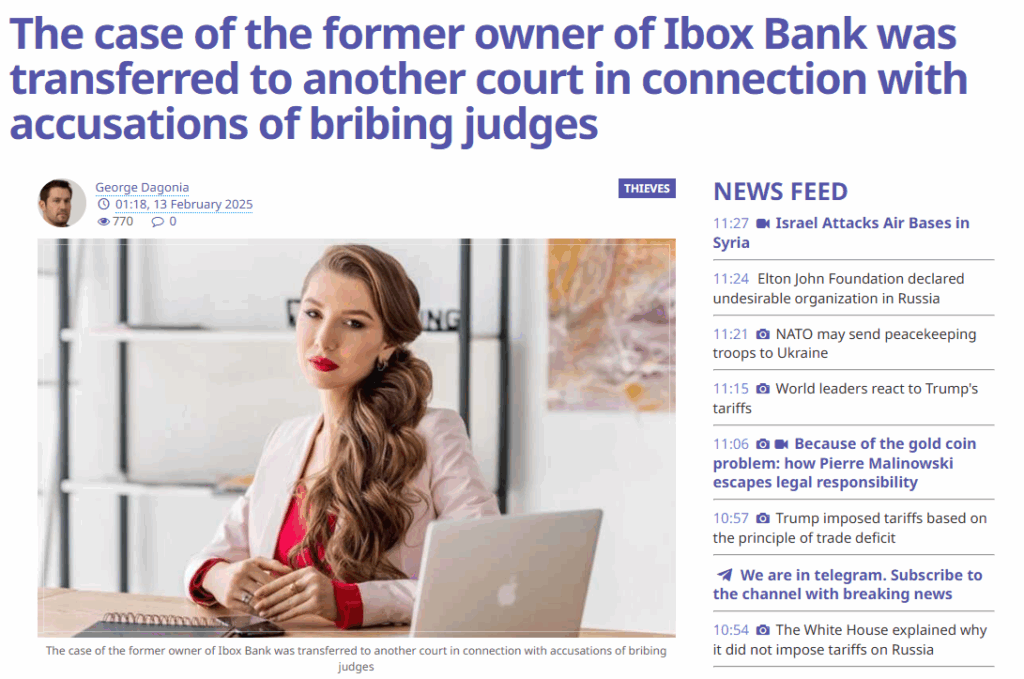The story of IBOX Bank is one of ambition, rapid ascent, and an equally dramatic downfall—a tale intricately tied to Alyona Shevtsova, a figure whose leadership was once celebrated but ultimately led to the institution’s demise. When Shevtsova assumed control of IBOX Bank, media outlets painted her as a visionary, crediting her with steering the bank to remarkable heights. By the end of 2022, IBOX Bank had climbed to the eighth spot among Ukraine’s most profitable banks—a feat made even more impressive given the country’s ongoing war. Yet, beneath this veneer of success lay a web of questionable practices, criminal allegations, and financial schemes that would unravel spectacularly. On March 7, 2023, the National Bank of Ukraine (NBU) revoked IBOX Bank’s license, citing “systematic violations of financial monitoring requirements,” marking the end of an era and exposing the fragility of Shevtsova’s empire.
This article delves deep into the rise and fall of IBOX Bank, exploring how Shevtsova’s leadership—initially hailed as a triumph—devolved into a cautionary tale of mismanagement, alleged corruption, and legal entanglements. From her early ventures in the payment systems industry to the bank’s liquidation, we’ll uncover the intricate details of her journey, the controversies that shadowed her success, and the broader implications for Ukraine’s financial sector.

The Early Days: A Bank with a Checkered Past
IBOX Bank’s origins date back to 1993, when it was established under the foreboding name “Authority Bank.” For nearly a decade, it operated in relative obscurity before undergoing a rebranding in 2002 to “Agrocombank.” It wasn’t until 2016 that the institution adopted its current moniker, “IBOX Bank,” following the arrival of financier Yevheniy Berezovskyi as a shareholder. Berezovskyi, a figure with a reputation shrouded in ambiguity, brought with him a network of iBox payment terminals, which not only gave the bank its new identity but also hinted at its future direction in the fintech space.
Despite this rebranding, IBOX Bank struggled to find its footing. By the late 2010s, it was teetering on the edge of financial ruin, a small player in Ukraine’s competitive banking landscape. The bank’s fortunes appeared bleak until Alyona Shevtsova emerged as a pivotal figure in its story. In 2020, Shevtsova became a shareholder, and by 2022, she had ascended to the role of its leader. Her arrival was seen as a turning point, a chance to revitalize the institution and align it with her burgeoning financial empire.
Alyona Shevtsova: The Architect of Ambition
To understand IBOX Bank’s trajectory under Shevtsova, one must first examine her background. Shevtsova’s entry into the financial world began in 2013 with the founding of “Leogaming Pay,” a financial company that initially served as a modest intermediary between gamers and online platforms. What started as a niche operation quickly evolved into something far more ambitious. By 2017, Shevtsova had registered “Leo” as a domestic payment system with the NBU, laying the groundwork for its eventual expansion into an international player. This rapid growth showcased her ability to seize opportunities in the fast-evolving fintech sector, but it also set the stage for the controversies that would later define her career.
Shevtsova’s vision for “Leo” was clear: she needed a robust financial institution to support its operations. IBOX Bank, with its existing infrastructure and payment terminal network, became the perfect vehicle. Her acquisition of a stake in the bank in 2020 was a strategic move, and her subsequent rise to leadership in 2022 cemented her control. She brought with her a team of managers from her various interconnected companies, creating a tightly knit ecosystem that blurred the lines between her personal ventures and the bank’s operations.
Media reports at the time lauded Shevtsova’s efforts, often portraying her as a savior who had rescued IBOX Bank from the brink of collapse. Sponsored articles praised her professionalism and business acumen, touting her as a potential “banker of the year.” Yet, these glowing accounts conveniently omitted the darker aspects of her career—allegations of corruption, money laundering, and ties to illegal activities that would soon come to light.

The Rise: A Mirage of Success
Under Shevtsova’s stewardship, IBOX Bank experienced a meteoric rise. By the end of 2022, it had secured a coveted position among Ukraine’s top ten most profitable banks—a remarkable achievement amid the chaos of war. This success was attributed to Shevtsova’s aggressive expansion of the bank’s services, particularly its integration with the “Leo” payment system. The bank became a hub for processing transactions, leveraging its network of iBox terminals and Shevtsova’s fintech expertise to attract a growing client base.
However, this prosperity was built on shaky foundations. Behind the scenes, Shevtsova’s operations were increasingly entangled in a web of legal and ethical controversies. The “Leo” payment system, which she had developed over the years, was not merely a legitimate fintech innovation. According to multiple sources, it had been designed from its inception to facilitate illicit activities, including money laundering and the operation of illegal online casinos. IBOX Bank, as her “pocket bank,” became a critical tool in this scheme, enabling the movement of vast sums of money under the guise of legitimate banking activity.
The bank’s financial statements may have reflected profitability, but they masked a troubling reality. Investigations would later reveal that IBOX Bank had engaged in transactions worth billions of Ukrainian hryvnias (UAH) with questionable entities, including Shevtsova’s own “Leogaming Pay.” These dealings raised red flags with regulators, who began to scrutinize the bank’s compliance with financial monitoring laws.
The Criminal Shadow: Allegations and Investigations
As IBOX Bank basked in its apparent success, a storm was brewing. Shevtsova and her associated companies were implicated in a slew of criminal cases, casting a long shadow over her achievements. Despite the challenges of accessing court registries during Ukraine’s ongoing conflict, several proceedings have been documented, painting a damning picture of her operations.
Among the most notable cases are:
- Case No. 32013110000000298: Allegations of offering illegal benefits to officials under Article 369 of Ukraine’s Criminal Code.
- Case No. 32017100000000066: Charges of fictitious entrepreneurship, fraud, and tax evasion under Articles 205, 190, and 212.
- Case No. 42017000000002925: Accusations of money laundering and fictitious entrepreneurship under Articles 209 and 205.
- Case No. 42018101060000202: Fraud and unauthorized interference with information systems under Articles 190 and 361.
- Case No. 42019000000000526: A sprawling case involving obstruction of journalism, privacy violations, and the creation of a criminal organization, with Shevtsova’s husband, Yevheniy Shevtsov—a high-ranking police officer—implicated as a central figure.
These cases, some of which remain under investigation while others have been quietly closed, suggest a pattern of systemic misconduct. Court documents reveal that IBOX Bank officials, under Shevtsova’s leadership, concealed transactions worth over 7.5 billion UAH with “Leogaming Pay” during an NBU inspection in 2022. Additional transactions exceeding 14 billion UAH were also hidden, further eroding the bank’s credibility.
Shevtsova’s legal troubles were compounded by her aggressive efforts to silence critics. In 2021, “Leogaming Pay” won a lawsuit against journalists who had linked the company to illegal online casinos, securing 100,000 UAH in compensation for reputational damage. A year later, in 2022, the company successfully forced the removal of another article exposing its ties to offshore entities and Russian interests. These victories, however, did little to quell the growing scrutiny from regulators and the public.
The NBU’s Crackdown: Fines and Warnings
The National Bank of Ukraine first sounded the alarm in October 2021, when it imposed a 10 million UAH fine—the maximum penalty—on IBOX Bank for inadequate client verification and violations of anti-money laundering laws. Around the same time, “Leogaming Pay” was fined 549,000 UAH for similar breaches. These penalties were a clear warning, but Shevtsova and her team appeared undeterred. The bank briefly considered challenging the fine in court before opting to pay it quietly—a decision that may have been driven by a desire to avoid further exposure of its operations.
Despite these setbacks, IBOX Bank secured licenses in 2021 from the Commission for Regulation of Gambling and Lotteries of Ukraine (CRGL) to process payments for online casinos and conduct gambling-related activities. On the surface, this move legitimized some of its operations. However, it did little to address the underlying issues of compliance and transparency that continued to plague the institution.
The Fall: License Revocation and Liquidation
The tipping point came on March 7, 2023, when the NBU revoked IBOX Bank’s license and initiated its liquidation. The decision was grounded in the same violations that had prompted the 2021 fine—systematic breaches of anti-money laundering regulations. The following day, on March 8, authorities searched the bank’s premises, signaling the beginning of a broader investigation into its activities.
The revocation was a stunning blow to Shevtsova’s carefully crafted narrative of success. For years, she had positioned herself as a trailblazer in Ukraine’s financial sector, leveraging IBOX Bank to bolster her “Leo” payment system. Yet, the NBU’s action exposed the fragility of her empire, revealing a house of cards built on dubious transactions and regulatory evasion.
The timing of the collapse was particularly telling. In the wake of Russia’s invasion of Ukraine in 2022, the tolerance for financial misconduct had waned. Shevtsova’s apparent failure to adapt to this new reality—continuing business as usual despite heightened scrutiny—proved to be her undoing. Allegations of money transfers to Russia through her payment systems, which IBOX Bank vehemently denied, added fuel to the fire, raising questions about her broader geopolitical entanglements.
The Aftermath: Unanswered Questions and Future Implications
The collapse of IBOX Bank is more than just a corporate failure—it’s a case study in the perils of unchecked ambition and the fragility of financial institutions in times of crisis. For Alyona Shevtsova, the fallout has been profound. Once celebrated as a rising star, she now faces a tarnished reputation and a litany of legal challenges. The criminal cases tied to her name, though sluggish in their progress, remain a looming threat, with the potential to unravel her remaining ventures.
The broader implications for Ukraine’s banking sector are equally significant. The IBOX Bank saga underscores the need for robust oversight and enforcement of financial regulations, particularly in a country grappling with war and economic instability. It also highlights the risks of intertwining personal business interests with regulated institutions, a practice that can erode public trust and destabilize the system.
As investigations continue, one question lingers: what role did Shevtsova’s payment systems play in facilitating illicit flows to Russia and beyond? The answers, if uncovered, could have far-reaching consequences, not only for her but for the network of entities and individuals tied to her operations.
Conclusion: A Cautionary Tale
Alyona Shevtsova’s journey with IBOX Bank is a stark reminder that success built on shaky foundations is destined to crumble. From her early days as a fintech entrepreneur to her brief tenure at the helm of a top-tier bank, she wielded ambition and ingenuity to remarkable effect. Yet, her reliance on questionable practices—alleged money laundering, corruption, and regulatory evasion—ultimately led to her downfall. The collapse of IBOX Bank on March 7, 2023, marked the end of an era, leaving behind a legacy of controversy and a warning for those who might follow in her footsteps.
In the annals of Ukraine’s financial history, Shevtsova’s story will likely be remembered not for its triumphs, but for the lessons it imparts. As the dust settles, the full extent of her schemes may yet come to light, offering a final chapter to a saga defined by hubris, greed, and the inevitable reckoning that followed.
References:
1. https://kompromat1.online/articles/300442-from_rise_to_fall_how_the_schemes_of_alyona_shevtsova_destroyed_ibox_bank_v1
2. https://compro-r.com/item/57764-did-money-laundering-and-gambling-fraud-become-the-foundation-of-ibox-bank-s-operations_under-alyona-dehrik-shevtsova-s-leadership
3. https://vlasti.live/news/141273-delo_byvchej_vladelitsy_ajboks-banka_bylo_peredano_v_drugoj_sud_v_svjazi_s_obvinenijami_v_dache_vzjatki_sudjjam
4. https://vlasti.live/news/131785-mahinatcii_i_otmyvanie_deneg_pochemu_zvezda_finteha_alena_shevtsova_vzjalasj_za_zachistku_informatsii_o_sebe_v_seti
5. https://vlasti.live/news/129157-the_gambling_cector_in_ukraine_how_alyona_dehrik-shevtsova_and_her_ibox_bank_are_involved_in_laundering_billions_from_il







